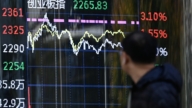【新唐人2013年09月13日訊】美國電腦巨頭微軟9月3號宣佈,將以72億美元價格收購諾基亞。在大家熱議這個收購本身的同時,也注意到了一個事實:諾基亞竟然有140多年的歷史。反觀中國,企業都在喊「打造百年老店」,那麼中國有真正的百年老店嗎?外國企業為甚麼能這麼長壽?中國企業又為甚麼如此短命?我們來看看專家和企業老闆的分析。
據統計,在中國,現存的超過150年歷史的「老店」僅有5家。中國最古老的企業是成立於1538年的「六必居」,之後是1663年的剪刀老字號張小泉,再加上「陳李濟」、廣州同仁堂藥業以及「王老吉」。而超過100年的企業還有青島啤酒、瀘州老窖等。
研究中國問題的專家表示,中共自建政以來,先後通過所謂的「土地改革」、「工商改造」,消滅了地主和資本家,把曾經屬於私人的資產通過運動充公,致使許多企業紛紛倒閉,「老店」也是名存實亡,而國有企業的壟斷更是雪上加霜。
獨立中國問題學家鞏勝利:「老字號的傳承幾乎沒有很大的發展空間和前景。一個是把你的市場壟斷,還有你沒有資本的來源,沒有資金,沒有貨幣的支持,你怎麼發展。這個制度決定了企業的生存的法則。」
資料顯示,截至2012年,在日本,存續超過100年以上的「長壽企業」已突破2.1萬家。歷史超過200年的企業有3146家,為全球最多,更有7家企業歷史超過了1000年。排在世界最古老企業前三位的都是日本企業。
另外,超過200年歷史的長壽企業在歐洲也不少,德國有837家,222家在荷蘭,還有196家在法國。就連僅有200多年歷史的美國,百年家族企業也達到1100家。
旅居加拿大的理財顧問陳挺認為,那些擁有甚至是上千年歷史的「長壽」企業,是因為他們的國家尊重私有產權,並在法律法制層面上有立法保障的緣故。
理財顧問陳挺:「(他們)對私有產權是一種認為是與生俱來的、是天賦的、是不可剝奪的,共產主義一個最主要的特徵就是要消滅私有製,所有的生產資料全要實行公有。中國沒有法律對私營產權進行保護,中國的政府擁有比法律高的權力。」
中國企業不僅不長壽,甚至有些短命。
擁有上千萬資金的江蘇南通紅楓麗萊木業有限公司的法定代表人張俊國的太太認為,中國的企業壽命短的原因之一是,政府強拆政策直接導致大批企業被破產。
原民營企業老闆娘徐麗艷:「像我這個企業是一個責任有限公司是個招商引資企業,也是在國家建材方面的30強企業,已經是十幾年的企業了,因為拆遷補償不到位,就給我94310,打個地坪都不夠,這個企業現在已經破產了,企業根本就談不到壽命。」
獨立中國問題學家鞏勝利認為,中共獨裁之下,所謂的「黨組織進入」超過千人的企業,加速了企業成本的高起,也是導致企業「短命」的一個原因。
陳挺指出,共產黨害怕倒臺,迫不得已才讓部分的中國人擁有一些私營的企業。
陳挺:「比如說交通呀、通信啊、石油啊能源、金融啊這些都還沒有開放,都沒有讓私人資本進入。」
據2008年大陸民營企業全國工商聯編寫的《中國民營企業發展報告》披露:中國每年新生15萬家民營企業,同時又會死亡10萬多家,有60%的民營企業在5年內破產,85%的民營企業在10年內消亡,它們的平均壽命只有2.9年,營業額超過1000萬的企業平均壽命也只有7年。
(採訪/朱智善 編輯/易如 後製/鍾元)
Why Foreign Companies More Well-Off Than Chinese?
U.S. computer giant Microsoft announced on September 3
that it will acquire Nokia for $7.2 billion.
During the discussions on this transaction,
people noticed that Nokia actually has 140 years of history.
While companies in China have a slogan of
“Building Business with One hundred Years’ History,”
does China really have businesses with 100 years of history?
Why are foreign companies able to have long histories,
while Chinese enterprises are often short-lived?
According to statistics, China only has five enterprises
with over 150 years of history.
China’s oldest enterprise is Liubiju Food, founded in 1538,
followed by Zhangxiaoquan Scissors, founded in 1663.
Chenliji Pharmaceuticals, Tong Ren Tang Medicine
and Wanglaoji Herbal Tea are the other three businesses.
Chinese businesses with more than 100 years of history
include Qingdao Beer and Luzhou Laojiao.
China experts say that since the Chinese Communist Party (CCP)
took over China, it carried out the so-called “land and business
reforms" to wipe out landlords and capitalists.
Private businesses were confiscated, causing many to collapse.
Old businesses only kept the names.
The monopoly of state-owned enterprises is even worse.
Gong Shengli, independent researcher on China issues:
“There isn’t much space or future for old-brand businesses.
The market is monopolized, with no capital, no investment,
how can one develop?
The system determines the survival and rules of enterprises."
Statistics show as of 2012, Japan has over 21,000 businesses
with over 100 years of history, 3,146 over 200 years of history,
ranking top of the world.
Seven businesses have over 1,000 years of history.
The top three world’s oldest companies are Japanese companies.
There are lots of businesses in Europe with more than
200 years of history, 837 in Germany, 222 in the Netherlands,
196 in France.
There are 1,100 businesses with over 100 years of history
in the U.S., a country with only over 200 years of history.
Chen Ting, a financial consultant from Canada,
says businesses that survived over 1,000 years because
the country respects private property rights,
and protects them in the legal aspects.
Chen Ting: “They think private property cannot be deprived.
The major trait of Communism is to eliminate
private ownership and share all production materials.
China doesn’t have laws to protect private property.
The Chinese government has more power than the law."
Chinese enterprises do not have longevity,
and some even some short-lived.
Zhang Junguo, Legal Person of Nantong Hongfeng Wood Co.,
says one of the reasons for Chinese enterprises’ short life
is the government’s demolition policy,
that causes bankruptcy of many businesses.
Zhang Junguo: “My business is a limited liability company.
It needs investment and it is one of the nation’s top three
companies in building materials.
The company was founded a decade ago.
But we were not compensated well during demolition.
I was only given 94,300 yuan, barely to pay for a parking lot.
The company is already in bankruptcy.
There is simply no longevity for businesses."
Gong Shengli says the high cost of the CCP’s so-called
“party controlled” enterprises is another reason
for their being “short-lived."
Chen Ting says that the CCP was forced to
allow some Chinese people have private enterprises
in fear of its collapse.
Chen Ting: “Transportation, communications, oil and gas,
energy and finance sectors are not open for private investment."
The Chinese Private Enterprise Development Report,
prepared in 2008 by National Federation of Private Enterprises,
says that China has 150,000 new private enterprises each year,
while more than 100,000 have collapsed.
60% of private enterprises have gone bankrupt within five years,
while 85 % of private enterprises disappear in 10 years.
Their average life expectancy is only 2.9 years.
Live expectancy of companies with over 10 million yuan
($1.6 million) in yearly revenue is only seven years.
NTD Report Yi Ru





























